Reviews
Louis Malle
France / West Germany, 1975
Credits
Review by Bernardo Rondeau
Posted on 24 November 2010
Source Torrent download
Categories Malle Entendu: The Ecstatic, Eclectic Cinema of Louis Malle
A filmmaker both renowned and reprimanded for the sheer diversity of his output, Louis Malle pushed eclecticism to the point of eccentricity in 1975’s Black Moon. Ostensibly inspired by Alice’s Adventures in Wonderland, it’s a trance film disguised as a grown-up fairy tale. Serenely disorienting instead of fully irrational, it is far more poetic than psychedelic, keeping its cosmic overhead low in favor of oneiric authenticity. Economic bordering on austere, Black Moon lingers on the edge of all-consuming weirdness but never succumbs to it. For better or worse, Malle is no Jodorowsky.
Over a single day and its long night, teenager Lily literally trips her way through a series of increasingly bizarre encounters on a country manor that’s more Eraserhead than Brideshead. We’re introduced to our Alice mid-journey. Barreling along an empty country highway as dawn buzzes with animal life, she plows a badger sniffing the blacktop. Stopping her car to survey the kill, she’s androgynous in a trenchcoat and fedora. Her steady gaze the first of many pregnant stares in a film largely devoid of dialogue though full of inquiry.
Just as she disrupts daybreak’s idyll with her speed racing, so Lily’s own course is continually derailed. First, it’s by a military blockade: gathered around a colossal tank, a band of grizzled men in worn fatigues execute a small female battalion as Lily looks on. One of the soldiers approaches her car and, snatching her hat, reveals her flowing blond tousle. This action sends her hurtling off the tarmac and onto the grass, escaping under a hail of bullets with a smashed windshield. Later, as Lily wanders on foot after disposing the car, she spies a clearing where armed women are torturing a male captive. Though never addressed in the film, these and other images of armed inter-gender violence are the only glimpses of a larger conflict: a literal battle of the sexes raging off-screen. It may be a clumsy conceit when stated outright, but Malle renders it succinctly, registering fleeting moments of muted barbarism.
As she traverses the wild under cover of grey skies and the muffled thunder of distant bombing, Lily is silently confronted by a lone rider (played by Alexandra Stewart, raven-haired and feral) on a black horse who leads her to a rustic chateau - Malle’s own - which is ringed by constant activity. Naked children stampede alongside a corpulent pig, a stout farmhand sings arias as he tills (Warhol icon Joe Dallesandro in a surprise bit of casting), a squat black unicorn lingers in the periphery. Its doors open, the house percolates with fireplaces blazing, pots burbling in the kitchen, and four-legged critters about.
Upstairs, Lily discovers a bed-ridden old woman who converses in a dialect with passing Slavic intonations to a sniveling rat. Or she whispers into a beeping transmitter, when not succumbing to seance-like spells. The increasingly obscure interactions between Lily and this beached matriarch, cycles of nurturing and hostility, make up nearly half of Black Moon. The rest is largely Lily, and the film itself, questing.
Mad with animism, Black Moon equates the four-legged with their masters. Everyone’s a beast, language is fleeting. A piglet speaks, but hunky Dallesandro is dead mute. Most of the human relations border on telepathy and one of the film’s few tête-à-têtes occurs between Lily and the single-horned equine. Throughout the film, Malle seems to be teasing out John Berger’s observation that “animals first entered the imagination as messengers and promises.”
The terrarium-like isolation of the country manor courses with carnal symbolism. Snakes slither in the garden and out of drawers. A freshly-slaughtered lamb is served up for dinner. All manner of dairy is ingested, most saliently breast milk. Associative to the core, the film’s climax is foreshadowed by a painting that depicts a man saber-slicing a bird mid-flight to his female companion’s tearful disapproval. The film’s tension is free-floating, though it seems rooted in the dread of growing up. Lily is summoned to play out an Edenic childhood only to have the intensity of its primal forces push her into adulthood. Cathryn Harrison, at fifteen already a veteran of groovy French fantasies thanks to a part in Demy’s The Pied Piper, carries the film with her Pre-Raphaelite magnetism and searching eyes. Always in motion, her performance is so subtly physical it borders on dance.
Although released the same year as Picnic at Hanging Rock, a similar eldritch saga of a female pubescence gone missing in the brush, Malle’s film hardly shares its stature. Perhaps it’s the talking unicorn or maybe just the fact that there’s no single mystery to be unraveled here, but Black Moon is a spiral of conflicting intrigues and omnidirectional mysticism. Still, Malle handles it all with disarming determination. The film’s sound design was rightfully awarded a Cesar: with its tapestry of sibilances, crackles and drones, it’s a world unto itself. But it may be the limpid, soft-edged clarity of Sven Nykvist’s cinematography, also Cesar-winning, that tempers the film’s magical inclinations. Rendered in earthy browns and cumulus whites, its autumnal palette nicely complements the Baltic crispness of his work a decade later on Tarkovsky’s The Sacrifice, another tale of off-the-grid oddity and looming cataclysms. If anything, Black Moon’s cockeyed naturalism foreshadows the deadpan absurdities of Albert Serra and Apichatpong Weerasethakul.
Instinctual and largely improvised, Black Moon seems to tie together the loose strands of Malle’s misshapen oeuvre: the backdrop of war and ambient tension, an undercurrent of ravenous curiosity, and the observation of a closed universe and its rituals - be it on a sea-bed, among Toda tribesmen or in the director’s own backyard - as it teems with life.
More Malle Entendu: The Ecstatic, Eclectic Cinema of Louis Malle
-
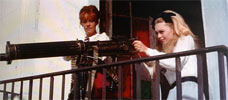
Viva Maria!
1965 -
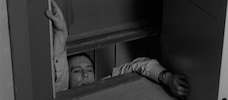
Elevator to the Gallows
1957 -

Zazie dans le métro
1960 -
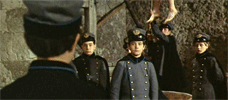
William Wilson
1968 -
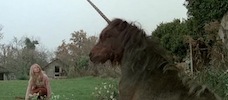
Black Moon
1975 -

Lacombe, Lucien
1974 -

Atlantic City
1980 -
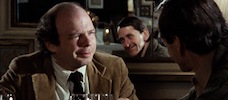
My Dinner with Andre
1981 -
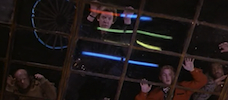
Crackers
1984 -
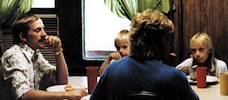
God’s Country
1985 -

Vanya on 42nd Street
1994
We don’t do comments anymore, but you may contact us here or find us on Twitter or Facebook.



